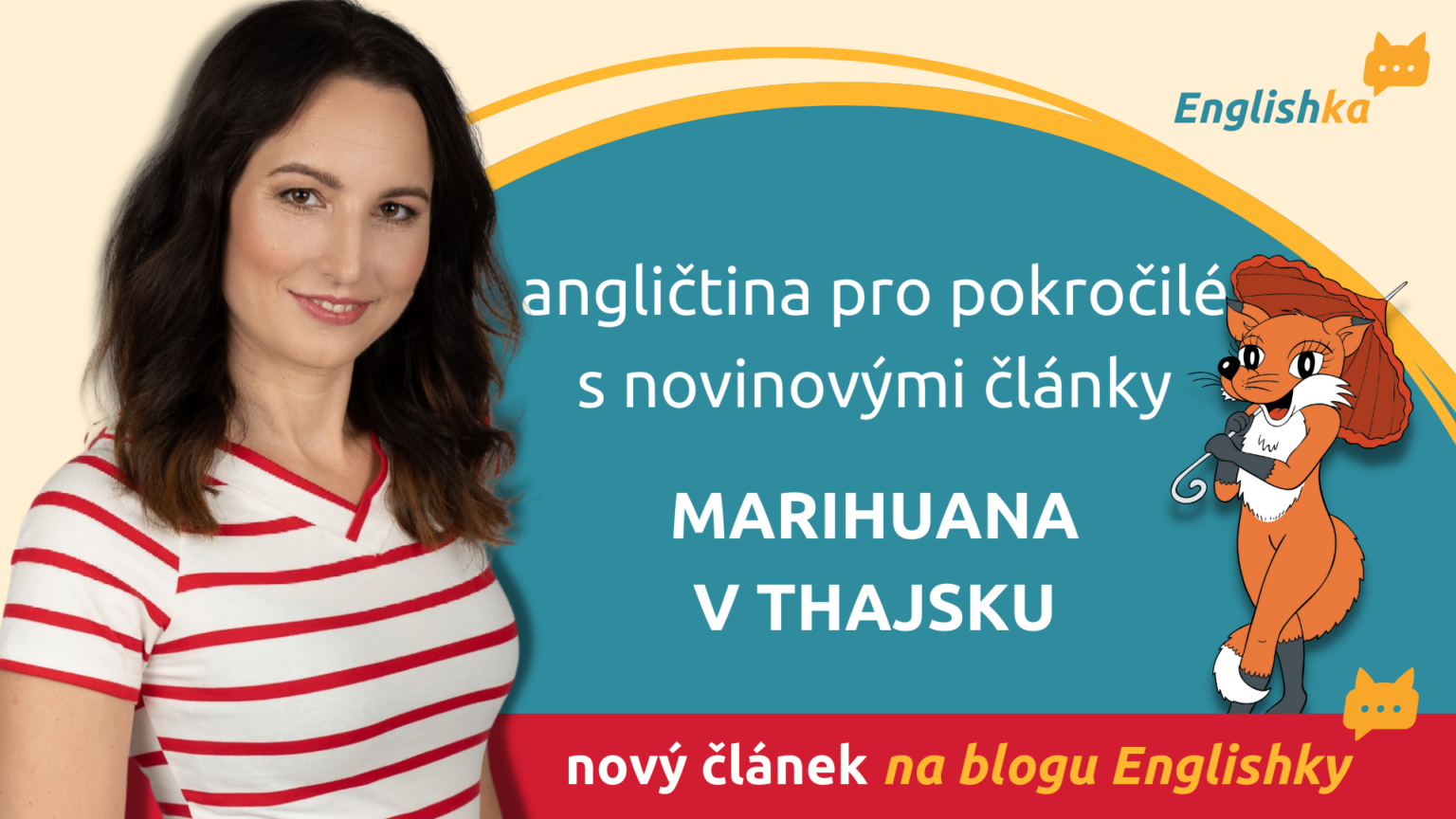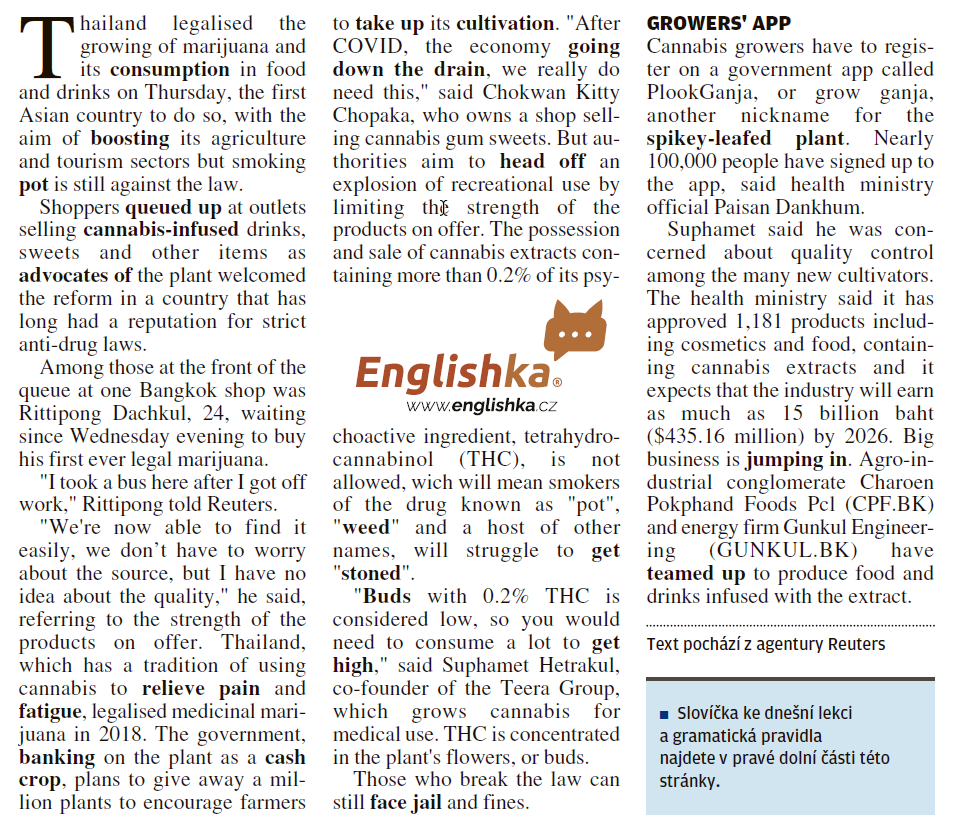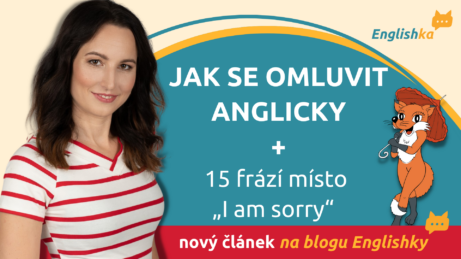Angličtina pro pokročilé s novinovými články (5.) – marihuana v Thajsku

Víte, jak to má Thajsko s marihuanou?
Co si takhle procvičit angličtinu a zárověň zjistit (možná) nové informace ze světového dění?
V tomto článku na vás čeká úryvek z novin, poté vypsaná slovní zásoba, vysvětlená gramatika (v tomto případě modální sloveso „have to“) a na závěr krátké cvičení, které prověří vaše znalosti.
1. Novinový článek
Thailand legalises marijuana
Thailand makes growing and consumption of marijuana in food and drinks legal in order to help its economy

Thailand legalised the growing of marijuana and its consumption in food and drinks on Thursday, the first Asian country to do so, with the aim of boosting its agriculture and tourism sectors but smoking pot is still against the law.
Shoppers queued up at outlets selling cannabis-infused drinks, sweets and other items as advocates of the plant welcomed the reform in a country that has long had a reputation for strict anti-drug laws.
Among those at the front of the queue at one Bangkok shop was Rittipong Dachkul, 24, waiting since Wednesday evening to buy his first ever legal marijuana.
„I took a bus here after I got off work,“ Rittipong told Reuters.
„We’re now able to find it easily, we don’t have to worry about the source, but I have no idea about the quality,“ he said, referring to the strength of the products on offer. Thailand, which has a tradition of using cannabis to relieve pain and fatigue, legalised medicinal marijuana in 2018. The government, banking on the plant as a cash crop, plans to give away a million plants to encourage farmers to take up its cultivation. „After COVID, the economy going down the drain, we really do need this,“ said Chokwan Kitty Chopaka, who owns a shop selling cannabis gum sweets. But authorities aim to head off an explosion of recreational use by limiting the strength of the products on offer. The possession and sale of cannabis extracts containing more than 0.2% of its psychoactive ingredient, tetrahydrocannabinol (THC), is not allowed, wich will mean smokers of the drug known as „pot“, „weed“ and a host of other names, will struggle to get „stoned“.
„Buds with 0.2% THC is considered low, so you would need to consume a lot to get high,“ said Suphamet Hetrakul, co-founder of the Teera Group, which grows cannabis for medical use. THC is concentrated in the plant’s flowers, or buds. Those who break the law can still face jail and fines.
GROWERS‘ APP
Cannabis growers have to register on a government app called PlookGanja, or grow ganja, another nickname for the spikey-leafed plant. Nearly 100,000 people have signed up to the app, said health ministry official Paisan Dankhum.
Suphamet said he was concerned about quality control among the many new cultivators. The health ministry said it has approved 1,181 products including cosmetics and food, containing cannabis extracts and it expects that the industry will earn as much as 15 billion baht ($435.16 million) by 2026. Big business is jumping in. Agro-industrial conglomerate Charoen Pokphand Foods Pcl (CPF.BK) and energy firm Gunkul Engineering (GUNKUL.BK) have teamed up to produce food and drinks infused with the extract.
2. Slovíčka
consumption [kənˈsʌmpʃən] konzumace
boost [buːst] podpořit, oživit
pot [pɒt] marihuana, tráva (hov.)
queue up [kjuː ʌp] stát ve frontě
cannabis-infused [ˈkænəbɪs ɪnˈfjuːzd] s obsahem konopí
advocate of sth [ˈædvəˌkeɪt] zastánce, stoupenec čeho
relieve pain [rɪˈliːv peɪn] ulevit od bolesti
fatigue [fəˈtiːg] únava
bank on sth [bæŋk ɒn] spoléhat (se) na co
cash crop [kæʃ krɒp] tržní plodina
take up sth [teɪk ʌp] začít se věnovat čemu
cultivation [ˌkʌltɪˈveɪʃən] pěstování, kultivace (plodin)
go down the drain [gəʊ daʊn ðə dreɪn] přijít nazmar (hovor.)
head off sth [hed ɒf] předejít čemu
weed [wiːd] marihuana, tráva (hovor.)
get stoned [get stəʊnd] sjet se, zhulit se (hovor.)
bud [bʌd] pupen, poupě
get high [get haɪ] být v rauši (slang.)
face jail [feɪs dʒeɪl] čelit vězení
spikey-leafed plant [spaɪki liːft plɑːnt] rostlina se špičatými listy
jump in [dʒʌmp ɪn] jít do toho, vrhnout se do toho
team up [tiːm ʌp] spojit se, začít spolupracovat
3. Gramatika a cvičení
V dnešním článku jsme se setkali s modálním slovesem have to (v záporu) ve větě: „We’re now able to find it easily, we don’t have to worry about the source, but …” („Nyní ji snadno seženeme, nemusíme se starat o zdroj, ale…”)
Co musíme a nemusíme, vyjadřujeme v angličtině pomocí modálního slovesa HAVE TO, za kterým následuje infinitiv. HAVE TO se používá pro vyjádření povinnosti nebo nutnosti něco udělat. Jde o objektivní povinnost, kdy je povinnost podložena faktem, například zákonem či případně jiným mluvčím, a mluvčí tuto povinnost pouze oznamuje.
V 3. osobě j. č. si musíme dát pozor na změnu tvaru na HAS TO a v minulém čase se HAVE TO změní na HAD TO.
Doplňte modální sloveso HAVE TO ve správném tvaru:
1. Tom…(write) an essay.
2. The police…(wear) a uniform.
3. Eve…(call) her boss yesterday.
Řešení:
1. has to write, 2. have to wear, 3. had to call
Chcete si přečíst více podobných článků? Podívejte se na článek o Fordovi, nebo na článek o Tomu Cruisovi.



